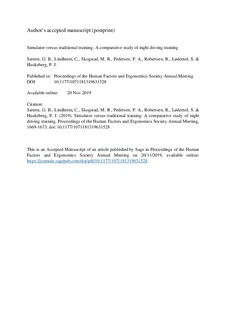| dc.contributor.author | Sætren, Gunhild Birgitte | |
| dc.contributor.author | Lindheim, Catharina | |
| dc.contributor.author | Skogstad, Martin Rasmussen | |
| dc.contributor.author | Pedersen, Pål Andreas | |
| dc.contributor.author | Robertsen, Rolf | |
| dc.contributor.author | Lødemel, Ståle | |
| dc.contributor.author | Haukeberg, Per Johan | |
| dc.date.accessioned | 2019-12-06T13:21:17Z | |
| dc.date.available | 2019-12-06T13:21:17Z | |
| dc.date.created | 2019-12-03T09:42:47Z | |
| dc.date.issued | 2019 | |
| dc.identifier.citation | Sætren, G. B., Lindheim, C., Skogstad, M. R., Pedersen, P. A., Robertsen, R., Lødemel, S. & Haukeberg, P. J. (2019). Simulator versus traditional training: A comparative study of night driving training. Proceedings of the Human Factors and Ergonomics Society Annual Meeting 2019, 1669-1673. doi: | nb_NO |
| dc.identifier.issn | 1071-1813 | |
| dc.identifier.uri | http://hdl.handle.net/11250/2632199 | |
| dc.description | Author's accepted version (postprint). | nb_NO |
| dc.description | This is an Accepted Manuscript of an article published by Sage in Proceedings of the Human Factors and Ergonomics Society 2019 Annual Meeting on 20/11/2019. | |
| dc.description | Available online: https://journals.sagepub.com/doi/pdf/10.1177/1071181319631528 | |
| dc.description.abstract | In recent decades, simulators have become an increasingly accepted part of training in sectors like aviation, medicine, and the petroleum industry. Some countries like the Netherlands, the UK, and Finland have accepted simulators as a part of driver’s education, but in Norway the use of simulators is both limited and restricted. This experimental study aimed to determine whether simulatorbased training in night driving could be beneficial compared to traditional Norwegian training. Two equal-sized groups of learner drivers completed both simulator training and traditional training, and both training sessions were followed by a multiple-choice test mapping the learner drivers’ theoretical knowledge on the topic. The results show that theoretical learning outcome is higher from simulator training compared to traditional training, indicating that an increased use of simulators could be beneficial in driver training. | nb_NO |
| dc.language.iso | eng | nb_NO |
| dc.publisher | Sage | nb_NO |
| dc.title | Simulator versus traditional training : A comparative study of night driving training | nb_NO |
| dc.type | Journal article | nb_NO |
| dc.type | Peer reviewed | nb_NO |
| dc.description.version | acceptedVersion | nb_NO |
| dc.subject.nsi | VDP::Teknologi: 500 | nb_NO |
| dc.subject.nsi | VDP::Samfunnsvitenskap: 200::Pedagogiske fag: 280 | nb_NO |
| dc.source.pagenumber | 1669-1673 | nb_NO |
| dc.source.journal | Proceedings of the Human Factors and Ergonomics Society Annual Meeting | nb_NO |
| dc.identifier.cristin | 1755839 | |
| dc.relation.project | The Research Council of Norway: 260524 | nb_NO |
